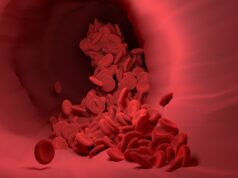Botox injections could provide an effective new treatment for stomach cancer, research has shown.
The rejuvenating anti-wrinkle treatment used by numerous celebrities slows tumour growth by blocking nerve signals that stimulate cancer stem cells. In laboratory tests, Botox – made from the toxin of botulism bacteria – proved ‘highly effective’ at suppressing gastric cancer in mice.
The promising results have led to the launch of an early clinical trial involving human patients with stomach cancer in Norway.
Locally administered Botox mirrored the effect of ‘vagotomy’ – surgical removal of branches of the gastric vagus nerve, which regulates processes linked to digestion.
U.S. lead researcher Dr Timothy Wang, from Columbia University Medical Centre in New York, said:
“Scientists have long observed that human and mouse cancers contain a lot of nerves in and around the tumour cells. We wanted to understand more about the role of nerves in the initiation and growth of cancer, by focusing on stomach cancer. We found that blocking the nerve signals makes the cancer cells more vulnerable – it removes one of the key factors that regulate their growth.”
Botox prevents nerve cells releasing a neurotransmitter – a chemical signal – called acetylcholine. In cosmetic treatments, blocking acetylcholine reduces wrinkles by temporarily paralysing face muscles.
The neurotransmitter is also known to stimulate cell division, hence the link to cancer. Co-author Professor Duan Chen, from the Norwegian University of Science and Technology, said:
“The anti-cancer effects were remarkable, especially with local vagotomy or by injecting Botox. It actually surprised us. The finding that Botox was highly effective was particularly exciting.”












